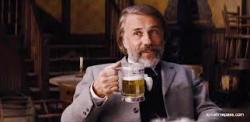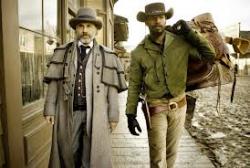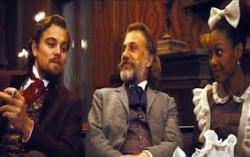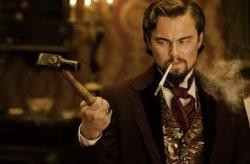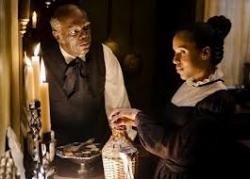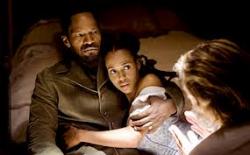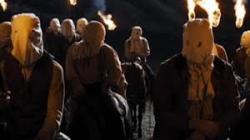The Good, The Bad and the slave trade
By Michael Roberts
Quentin Tarantino's cinema du visceral continues apace with his 2012 entry, the brutal and satirical western 'Django Unchained'. Tarantino again favours a revenge motif, as he had done for most of the naughties with his 'Kill Bill' films and the Jewish-Nazi revenge war film 'Inglorious Basterds', and it's as if he needs it to give himself the moral authority to film an ever increasing splatter content. The campy and throwaway quality of his other naughties flick, the exploitation hommage 'Death Race', needed no such moral weight, but Quentin leaves us in no doubt that Django's Seigried like quest to rescue Broomhilda is a righteous one, and killing slavers is therefore as justifiable as killing Nazi's, and the bloodier the kill, the better.
A small group of slaves, marching across country at night with their owners, are greeted by an odd foreigner in a painted wagon proclaiming, 'Dr Schultz, Dentist'. Dr Schultz (Christoph Waltz) makes the slavers an offer for one of their number, Django (Jamie Foxx) but the deal comes to a messy end. Django joins Schultz and learns he is a bounty hunter, and needs Django's ability to identify three of his quarry, the Brittle brothers. Schultz is an erudite and liberal man and offers Django his freedom and $75 once he helps him find and kill the Brittle brothers. The pair executes the pact, finding the brothers, but encounters a comical Klan posse before escaping and considering the future. Schultz has grown to know Django and his plight, of wanting to find and reunite with his wife, Broomhilda. Schultz makes a further offer, for Django to help him in his bounty hunting through the winter, "the kid's a natural", and he in turn will then help Django negotiate the unfriendly-to-blacks environment of Mississippi in 1858 in order to find Hildy.
Tarantino makes the brilliant decision to conflate the two unseemly activities of slaving and bounty hunting as a comment on the "flesh for cash" commonality they share. The literate musings of Schultz, gloriously expounded by Waltz in top form, make plain that money is the root of the issue, and Schultz approaches the conundrum primarily as a businessman, believing that everything is for sale in this frontier culture. Tarantino contrasts Schultz's European and high-culture demeanour with that of the rough hewn and raw culture where he finds himself, at one point he rails against a bad version of Beethoven played in a parlour he deems as beneath the dignity of the music. Interestingly Tarantino doesn't give any background as to how this literate character, who is able to wax lyrical about Alexander Dumas and speak at least three languages fluently, is also a deadly and methodical bounty hunter. Schultz proceeds through America on the mercenary assumption that everything has it's price, but when he sees a line of propriety is crossed he makes a principled stand, even though he knows the personal cost will be high.
'Django Unchained' ticks all the Tarantino fetish boxes as he tips his cap to spaghetti westerns, Ennio Moriconne music, a Franco Nero cameo, a garish title sequence, sudden zooms, cartoon-ish body count, and does enough to please his fan-boy audience. However, like 'Inglorious Basterds', there's a more serious subtext, as if Tarantino intuits he has to provide depth of content as well as visceral thrills. Tarantino is having fun with genre films, deconstructing established conventions and playing against expectations at many a turn, and this allows him to move from a broad 'Blazing Saddles' level humour at one point, to a tension filled drawing room standoff in another. It's a tonal balance that almost nobody else can get away with, and Tarantino even gilds the lily to the point he plays a slaver himself, with an Australian accent! Aussie actor John Jarrat is part of the trio who appear with Quentin, and if he helped him get the accent right he's done a great job, most Yanks struggle with the flatness of the sound, but Tarantino nails it. Hilarious.
The acting honours belong squarely with Christoph Waltz, he dominates every scene he's in, and imbues his dentist with the right level of cynicism and humanity, a delicate and difficult balancing act. Jamie Foxx is limited in what he's required to do, but he broods and bristles with the best of them, and brings a great presence via his intense and internalised anguish. Leonardo DiCaprio is fine as the southern dandy with an inappropriate sister fixation, and makes the best of the hammy-ness the character offers, but still flicks the switch to brutal anger with ease. Samuel L Jackson gets an unlikely scene stealing turn as an Uncle Tom character, and has great eye rolling fun with it.
Ultimately, 'Django Unchained' may not contribute to the intellectual acumen of a debate about slavery in the context of modern America, and it seems to have pissed off as many people as it has entertained, but it does at least raise the issue of what was a national stain. America's prosperity in the 19th century, heavily built on the back of slavery, was the product of a racist ideology that saw certain humans as commodities, and given America had made an art form of capitalism since day one the intersection was an unsurprising one. The uncomfortable facts are Southern America was benefiting from slavery even after the Northern states had abolished it in 1804, and 'enlightened' Germans like Schultz were both appalled and amazed. The final abolishing of slavery occurred as a side issue of the Civil War, but Lincoln himself stated that given the choice between breaking up the Union and freeing the slaves, he would have left the slaves in chains to keep the Union together. Ironically even Russia abolished it's own version of slavery, the serf system, some 20 years prior to the Americans.
Tarantino's job is not to write history, it is to entertain, and sometimes it's an artist's job to tease out a national dialogue on the things swept under the carpet. The film is as much a romantic quest with bullets as it is comment on slavery, but it's the latter that attracts the headlines. Slavery as a comedic or satirical subject may offend the thought police, but given it's been many years since the witty but lightweight, 'Skin Game', starring James Garner and Lou Gossett Jnr, maybe it's time for a new conversation to be started. In 'Django Unchained' Tarantino has produced a remarkable entertainment, which aligns with all his personal foibles and quirks, but beyond the body count overkill, rivers of blood and exploding limbs there lies a film with a questioning gaze, one that reminds America of an uncomfortable truth and of a past that still haunts it.

